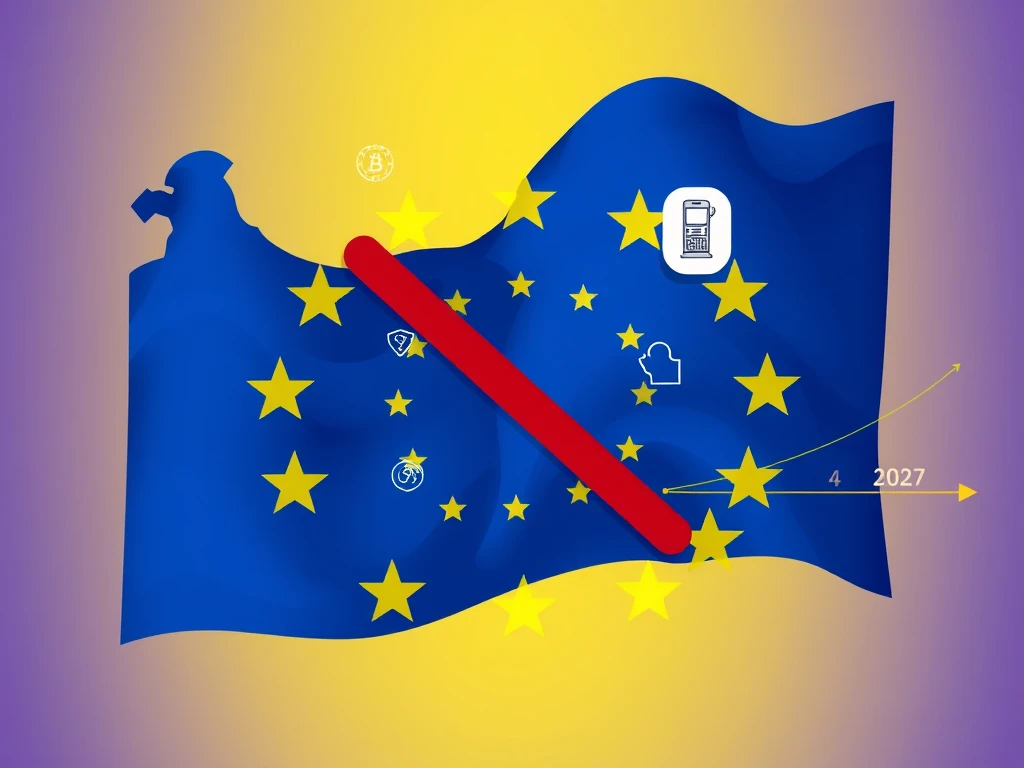Major EU Crypto Regulation: Anonymous Accounts and Privacy Tokens Banned by 2027

Get ready for a significant shift in the European crypto landscape. A major EU crypto regulation is set to reshape how digital assets are used, specifically targeting privacy and anonymity features. By 2027, the European Union plans to implement rules that will prohibit anonymous cryptocurrency accounts and ban the use of privacy-enhancing tokens. This move is part of a broader effort to combat money laundering and terrorist financing within the digital asset space.
The Coming Anonymous Crypto Ban
Under the new Anti-Money Laundering Regulation (AMLR), the EU is implementing a strict anonymous crypto ban. This isn’t just about specific types of tokens; it extends to the accounts themselves. Financial institutions, credit institutions, and importantly, Crypto Asset Service Providers (CASPs) operating within the EU will be forbidden from maintaining accounts that allow for anonymity. This means platforms will need to ensure they have identified their users, removing a layer of privacy previously available to some.
Why the Privacy Tokens Ban?
Beyond anonymous accounts, the regulation explicitly targets tokens designed to enhance privacy. This includes cryptocurrencies often referred to as ‘privacy coins’. The regulation establishes a clear privacy tokens ban for CASPs and financial institutions. Handling transactions or providing services related to these types of digital assets will be prohibited under the new rules starting in 2027. The aim is to prevent these tokens from being used to obscure the origin or destination of funds, making financial crime harder to track.
Understanding the EU AML Framework
This regulatory push is part of a comprehensive EU AML framework. The AMLR is one piece of a larger package, working alongside the Anti-Money Laundering Directive (AMLD) and the Anti-Money Laundering Authority Regulation (AMLAR). While the core framework is finalized, some implementation details, often referred to as the ‘fine print’, are still being worked out through delegated and implementing acts, primarily handled by the European Banking Authority (EBA). This means some specifics might be clarified over time, but the fundamental prohibition on anonymity is set.
Increased Oversight and Curbing Crypto Anonymity
The new framework also introduces increased oversight, particularly for larger CASPs. The Anti-Money Laundering Authority (AMLA) will directly supervise CASPs operating in at least six member states. This direct supervision aims to ensure consistent application of AML rules across the bloc and further curb crypto anonymity. AMLA plans to select around 40 entities initially, starting from July 1, 2027, based on materiality thresholds like having at least 20,000 customers in a host state or a total transaction volume exceeding 50 million euros ($56 million).
Other notable measures include mandatory customer due diligence for transactions exceeding 1,000 euros ($1,100). These steps build on previous EU regulations like MiCA, indicating a clear trend towards stricter control and transparency in the crypto sector.
What Does This Mean for the Future?
The impending anonymous crypto ban and privacy tokens ban represent a major shift for the European crypto ecosystem. While proponents argue these measures are necessary for financial integrity and combating illicit activities, critics raise concerns about privacy rights and the potential impact on innovation in the DeFi and Web3 space. CASPs operating in the EU need to begin preparing now to align their internal processes and policies with the upcoming requirements by 2027.
In summary, the EU’s new AML regulation signals a clear move away from anonymity in the crypto world. With bans on anonymous accounts and privacy tokens, coupled with increased oversight and due diligence requirements, the landscape for digital assets in Europe is set for significant change in the coming years.









